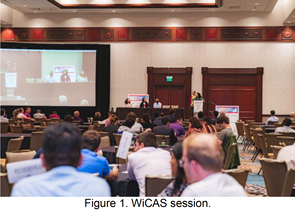
Women in Circuits and Systems (WiCAS) at ISCAS 2022
A “Women in Circuits and Systems” (WiCAS) event took place during the IEEE International Symposium on Circuits and Systems (ISCAS), held in Austin (TX), USA, from May 28th through June 1st, 2022. The event was held on May 30th, 2022, organized by Jennifer Blain Christen (Arizona State University, USA), and Nicole McFarlane (Univ. of Tennessee, Knoxville, USA).
The event was titled “Navigating the professional virtual/hybrid/in-person world”, and was hybrid in format and featured an in-person panel of three distinguished speakers of varying backgrounds:
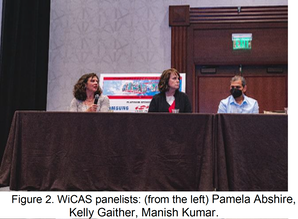
- Kelly Gaither, Director of Health Analytics/Senior Research Scientist at Texas Advanced Computing Center and Associate Professor in the Department of Women's Health at the Dell Medical School at UT Austin,
- Manish Kumar, Associate Professor in Civil, Architectural and Environmental Engineering, UT Austin, and
- Pamela Abshire, Professor in Electrical and Computer Engineering at University of Maryland, College Park.
The panel moderators were Jennifer Blain Christen and Nicole McFarlane.
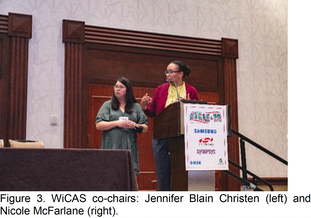
The 60-minute panel event kicked off with a brief oral summary of literature and statistics on increased female attendance at virtual meetings in science and engineering conferences and the panelists gave their viewpoints on the challenges of costs and logistics of the three meeting formats (virtual, hybrid, and in-person), participant engagement in virtual and hybrid formats, networking, and issues such as “zoom fatigue”. Although the in-person attendance at the conference was smaller than in past years, the event was well attended by the in-person attendees, who were able to enjoy high quality dessert snacks during the event.
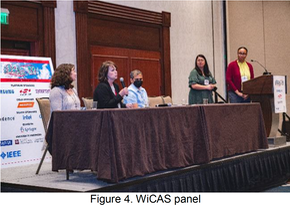
There were also online attendees, and the virtual portion of the event was open to all CAS members who were interested through a separate registration process. Virtual attendees were encouraged to reach out to other conference attendees, both in-person and virtual, through the conference platform. Finally, the video of the panel session was made available to all ISCAS 2022 registrants through the conference platform for about 2 months after the conference.
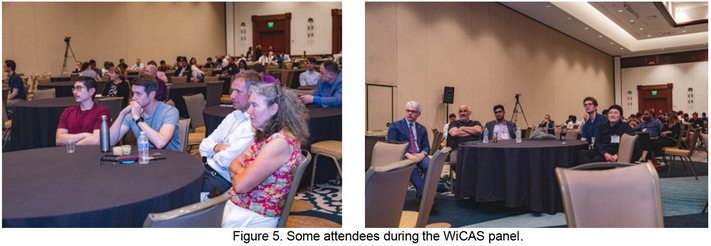
The WiCAS co-chairs express their gratitude to the IEEE Circuits and Systems Society, for the financial support for this event.
Giulia Di Capua
_______________________________________
Women in Circuits and Systems (WiCAS) and Young Professionals (YP) at PRIME-SMACD 2022
A “Women in Circuits and Systems” (WiCAS) event and a “Young Professionals” (YP) event took place during the International Conference on PhD Research in Microelectronics and Electronics (PRIME) and the International Conference on Synthesis, Modeling, Analysis and Simulation Methods, and Applications to Circuit Design (SMACD), jointly held in Villasimius, Sardinia, Italy, on June 12th to 15th, 2022. These events aim to inspire and motivate students and young professionals in the domain of circuits and systems to have efficient roles in their professions, by meeting successful engineers and professors and having stimulating technical and professional talks in different fields of interest of the IEEE Circuits and Systems Society.
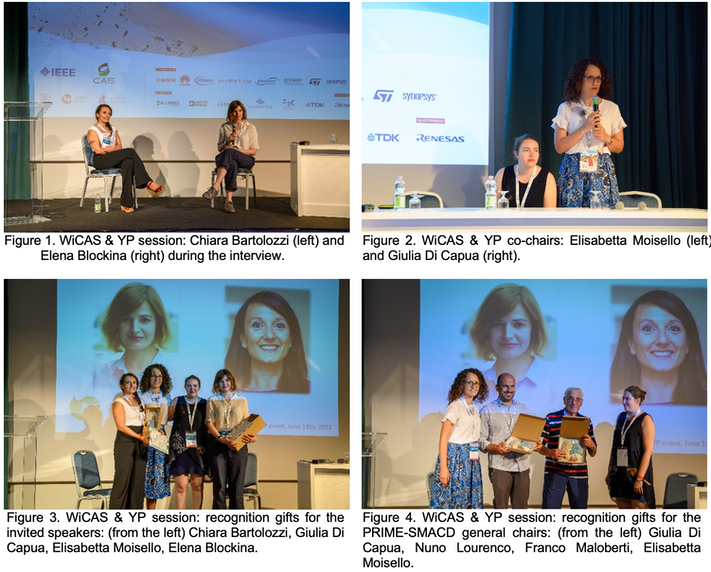
The joint WiCAS & YP event at PRIME-SMACD 2022 was held on June 13th, 2022, organized by Dr. Giulia Di Capua (University of Cassino and Southern Lazio, Italy), and Dr. Elisabetta Moisello (University of Pavia, Italy).
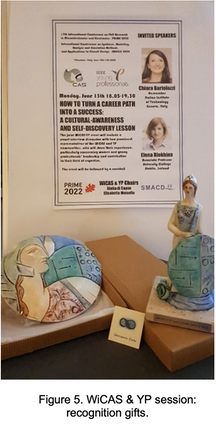
The event included a panel-interview, driven by the theme “How to turn a career path into a success: a cultural-awareness and self-discovery lesson”. The panel involved the participation of two well-recognized speakers: Dr. Elena Blockina, professor and researcher at University College Dublin (Ireland), expert in quantum computing and semiconductor devices for microelectronics, and Dr. Chiara Bartolozzi, researcher at the Italian Institute of Technology of Genoa (Italy), expert in advanced approaches in the design of sensors and algorithms for robotic perception. They scientifically introduced themselves, presenting their main activities in their own field of research, and above all highlighting difficulties, challenges and successes faced by their research teams. After these preliminary presentations, Elena and Chiara were involved in an emotional interview, driven by photos and statements, which gave them the opportunity to share feelings, ideas and perceptions about the role of young female researchers in the scientific community. The interview was an inspiring session on women’s leadership and gender equality paradigm.
A WiCAS & YP welcome cocktail was organized after the event, to thank all the attendees for their participation. All the participants received promotional items, gadgets and gifts during the social event.
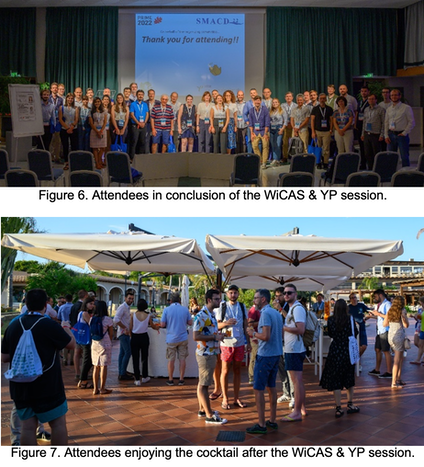
WiCAS Best Paper Awards and YP Best Paper Awards were also assigned for the two conferences. All WiCAS and YP winners were announced during the PRIME-SMACD 2022 awarding ceremony.
- A “SMACD WiCAS Best Paper Award” was assigned to Olympia Axelou, PhD student at the University of Thessaly (Greece), for her paper titled “Accelerating Electromigration Stress Analysis Using Low-Rank Balanced Truncation”.
- A “SMACD YP Best Paper Award” was assigned to Malek Teib, PhD student and analog design engineer at STMicroelectronics (France), for her paper titled “Multi-harvesting smart solution for self-powered wearable objects”.
- A “PRIME WiCAS Best Paper Award” was assigned to Paola Piedimonte, PhD student at the Politecnico di Milano (Italy), for her paper titled “Differential impedance biosensing platform for early diagnosis of viral infections”.
- A “PRIME YP Best Paper Award” was assigned to Alessandro Tontini, researcher at Fondazione Bruno Kessler (Italy), for his paper titled “Comparison of background-rejection techniques for SPAD-based LiDAR systems”.
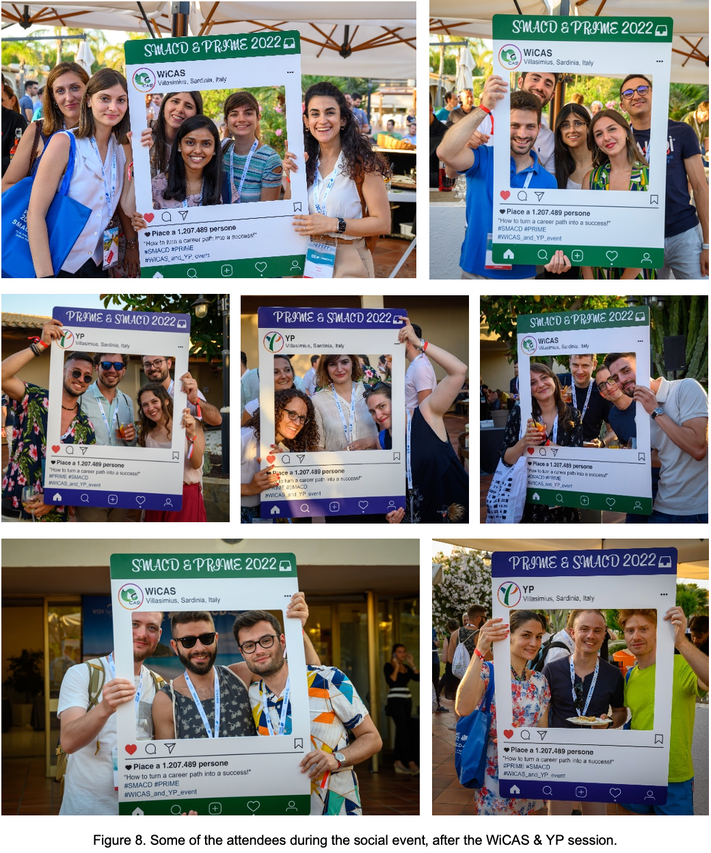
The WiCAS and YP co-chairs express their gratitude to the PRIME and SMACD 2022 general chairs, Prof. Franco Maloberti and Prof. Nuno Lourenço, and the conference organizing committee, for hosting the event. Thanks to Pragma Congressi, for the great technical support received during the definition of the event. And thanks to the IEEE Circuits and Systems Society, for the financial support that helped in making this event a great moment of professional and personal enrichment.
Giulia Di Capua
____________________________
WiCAS SEA Mentoring Program 2022
The IEEE WICAS Southeast Asia Mentoring Program 2022 was conducted virtually on Sunday, 6 March 2022, from 16.00-18.00 GMT+8. The event was the first iteration of a mentorship program that facilitates the matching of female engineers, especially IEEE or CAS members, to establish a mentoring partnership. Participation in the program is voluntary and intended to increase female participation and leadership in IEEE CAS in Southeast Asia. We do this by connecting experienced and early career/student female engineers, providing role models, mentoring, and networking opportunities between female engineers in Southeast Asia, and increasing their participation in IEEE CAS. There were 4 mentors and 12 mentees registered, but 4 mentors and 8 mentees attended.
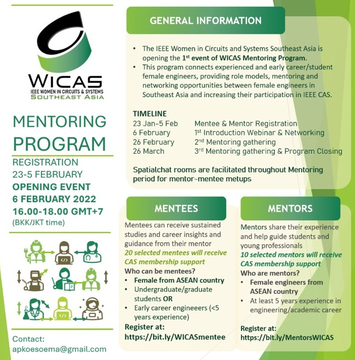
Figure 1 (left): Promotional Poster
Preparation & Registration
We disseminated an open call for mentors and mentees using a poster posted through social media, professional, academic and personal contact (Figure 1). Registration was done through Google forms. Mentors should be experienced female engineers, predominantly IEEE members, with the opportunity for a small number of prominent female engineers who are not IEEE members. Mentees are undergraduate or graduate students, young professionals (<30 years old), or persons returning to the workforce after a prolonged absence. One day before the event, we contacted potential mentors and mentees as a reminder with event information and what to prepare via email.
As a space, in lieu of a regular zoom meeting, we prepared an online virtual room/platform using Spatialchat that allows for more free mingling, simulating an in-person event networking atmosphere. The introduction email also included information on how to operate the Spatialchat platform.
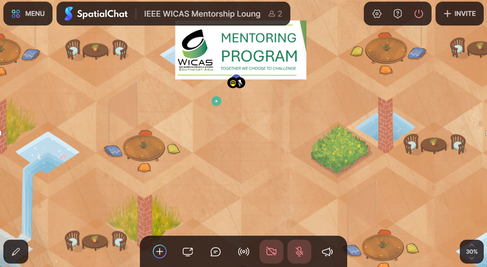
Figure 2 (right): Screenshot of the Event Space
Event Execution
The event was kickstarted by opening remarks on the program and the benefits of mentoring by Allya Koesoema. Afterward, each mentor and mentee introduced themselves, their background, and what they expected to get/impart from the mentoring session.
Afterward, participants were divided into breakout sessions for one-on-one speed mentoring sessions. Initially, each mentor was to be assigned a table. In each session, each mentor will be assigned 2-3 mentees and have 15 minutes for a short advice session. After 15 minutes, the mentee group will move to the next mentor table and start the Q&A session again. As there were fewer mentors and mentees, and mentees were more comfortable in groups, the session was divided into two tables, with each table hosting 2 mentors, and the mentees divided into two groups that took turns with each mentor. There was a productive discussion regarding many topics, including continuing studies, building confidence, and career paths between industry and academia, as well as other topics.
After the breakout session, all the participants congregated again, and the floor was opened for a discussion panel session moderated by Allya Koesoema, in which there was a lively discussion between the panel and the audience. The event was closed with an exchange of emails and an opportunity to communicate further to continue the mentorship relationship.
Follow-up and Evaluation
As a follow-up, the organizing team is currently trying to figure out what model would work well to grow the mentorship program, as we believe it is one of the ways to grow the WICAS community more broadly. One idea is to combine a webinar event with a speed mentoring event in which the webinar may attract more participants. Those interested can also stay for the mentorship session. Another is to group/cooperate with other sections or local WIE groups to increase critical mass. While the first event had several obstacles, we are planning to continue further after determining an improved model to go forward.
Allya Koesoema, CASS Indonesia Chapter
Lini Lee, CASS Malaysia Chapter